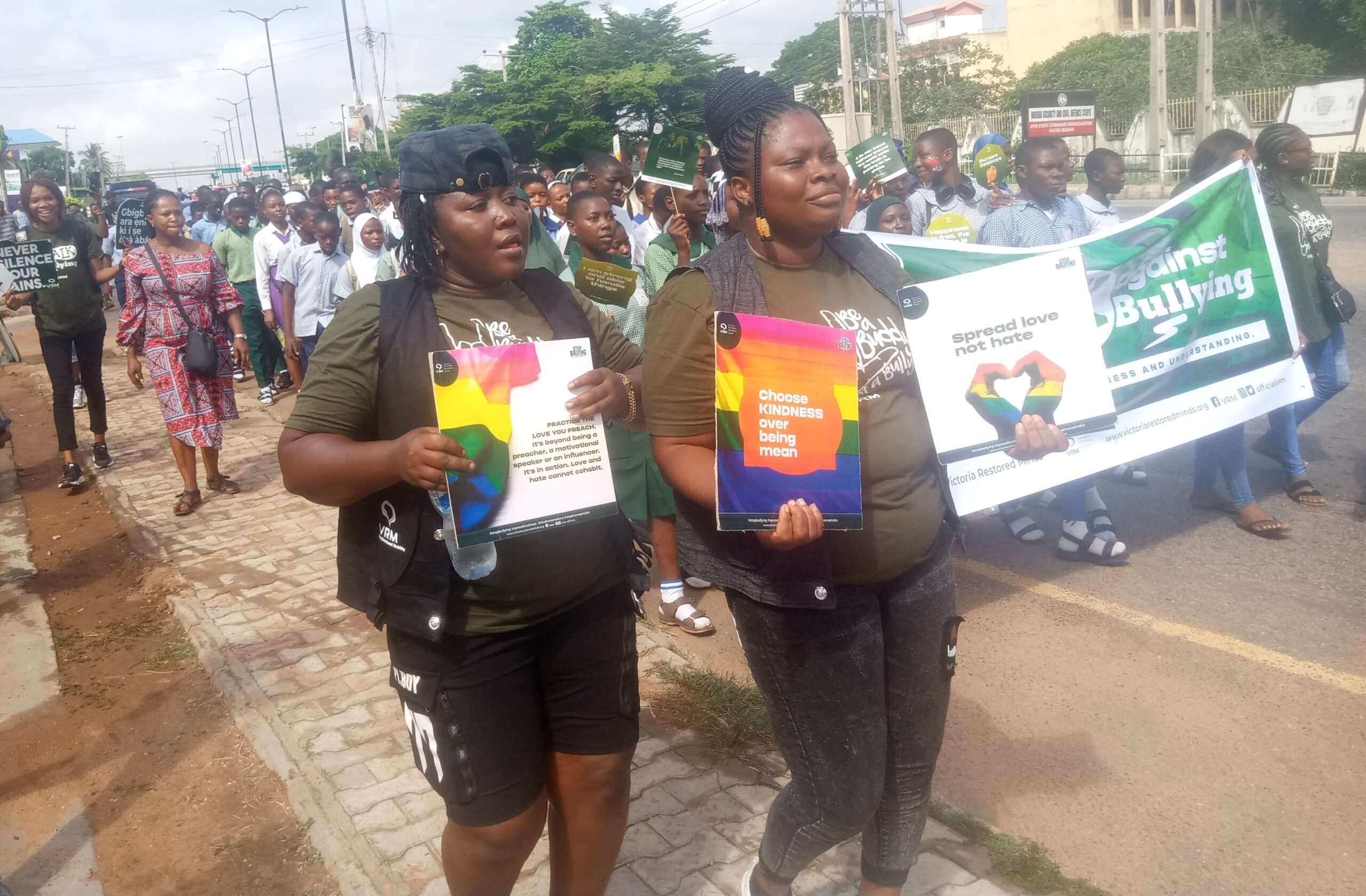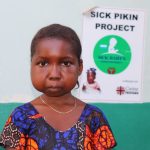IBADAN, OYO – At about 9 am on Saturday, June 4, 2022, about 200 people, including adults and secondary school students, gathered in front of the Oyo State Government Secretariat in Ibadan, a spot not new to small crowds.
It is sometimes a meeting point for citizens protesting against bad governance in the state or government workers demanding better work conditions. And these 200 people had gathered here to kick start another protest – not against the government this time, but against citizens bullying others – and to preach kindness.
“As you go about your life, always remember to show love, kindness, and understanding because that is the way the world can be a better place,” Victoria Thompson, founder of Victoria Restored Minds or VRM, charged the crowd.
For one hour and 30 minutes, they walked the streets of Ibadan holding placards with inscriptions like “say no to bullying,” stopping intermittently to explain the consequences of bullying to passersby.
The march marked the conclusion of VRM’s 2022 100-day campaign, a yearly event it organises to promote good mental health and encourage citizens to shun practices like abuse, bullying, stigmatisation and discrimination that lead to mental health disorders.
VRM is a social enterprise catering to people’s social and emotional well-being as part of efforts to reduce the rate of mental health disorders in Nigeria.
Prevalence of mental illness in Nigeria
While mental health disorders are a global problem affecting one in eight (970 million) people – including 280 million battling depression and suicidal thoughts, the prevalence is significantly higher in Africa, affecting 100 million people. That is about 10.3% of the global burden, partly because most African governments spend less than 1% of their yearly national health budgets on mental illness. Sadly, according to the World Health Organization, 50% of Africa’s mental disorders are in Nigeria.
While some Nigerians believe mental illness is spiritual punishment for wrongdoing, Taiwo Obindo, a professor of psychiatry at the University of Jos, said either nature or nurture could cause it.
“Nature has to do with the genetic predisposition and personality of an individual, [and] nurture deals with the individual’s environment,” he explained, naming bullying and emotional and sexual abuse as environmental issues that could cause mental illness.
It does not help that over 75% of people in low-and-middle-income countries like Nigeria do not have access to effective mental health treatment due to a lack of resources and a shortage of skilled healthcare providers.
Obindo said just 300 psychiatrists and nine federal neuro-psychiatric hospitals exist in Nigeria, a country of over 200 million people. The fear of discrimination and stigmatisation also discourages people with mental illnesses from seeking professional help.
VRM’s response
Mrs Thompson founded VRM in 2019 to provide therapeutic and emotional support to people facing mental health challenges. Besides its yearly 100-day campaign promoting attitudes that enhance good mental health, through its team of five specialists, including counsellors, therapists and psychologists, VRM engages and takes people living with mental illness through a long healing process from counselling to therapy.
People living with mental illness connect with VRM through referrals or by reaching out directly via email or phone calls. Upon first contact, VRM tries to understand the particular mental health challenge an individual faces by asking questions and documenting their contact information for follow-up.
Once the case is established, the individual is taken through repeated counselling sessions (virtually or physically, depending on the individual’s preference and condition). A counsellor typically offers words of encouragement.
Later, VRM’s psychologists and therapists guide the individual to talk about their feelings in detail, complete assignments like writing down their worries and set realistic goals. This process falls within what experts call psychodynamic, behavioural and cognitive behavioural therapy options for helping people with mental illness walk away from unconscious behaviours, thought patterns, emotions, relationships, reactions, and negative ideas responsible for their condition.
But for individuals who require clinical treatment, VRM refers them to hospitals. VRM’s counselling and therapy sessions last for three months but could be extended to six or more months, depending on the person’s condition.
In 2020, Femi Adeyemi’s (not real name) parents divorced. The separation affected his ability to concentrate at school, and soon he was drowning in depression.
“I was depressed, but my parents were only concerned about their divorce,” Adeyemi, a 500-level Agricultural and Resource Economics student at the Federal University of Technology in Akure, said. But “Speaking with VRM was a relief because I [had] thought of ending everything [through suicide].”
Like Adeyemi, Funmilola Adekanla, after suffering two miscarriages, sank into depression. And when she contacted VRM, “She [Thompson] gave me a mug [a cup with an inscription] that says ‘life is incomplete without you.’ I kept the mug where I could see it, and it encouraged me each day,” Adekanla, 27, said. “[Now], I don’t feel like taking my life, and I want to live and be happy.”
Thompson said VRM has supported about 2,000 mentally ill people. It does not charge its patients but raises funds by producing and selling mental health products like mugs, books, and therapeutic cards.
“The therapeutic card [sold for N2, 000 or $5.15] is called affirmation. It is a game, but it contains positive and affirming words,” she said.
During the first 99 days of VRM’s 100-day yearly campaign for good mental health, it creates awareness by visiting primary and secondary schools to explain to students bullying and its effects and crusading on social media. For example, it organises Twitter Spaces, where experts and participants discuss activities and attitudes that cause mental illness.
This is the video of WALK AGAINST BULLYING IBADAN. Akure is next, let’s come out massively to spread the message of love and kindness. Kindly RTW @iam_moyosawyer@AkureHowFar@callmewale@FineAkuregirl@AKURECITY@AyomideAdeagbo@ajii1201@officialnath_@cre8ted4impact#lovepic.twitter.com/1qsQh64BQt
— officialvrm (@MindsRestored) July 19, 2022
Lost identity
Thompson’s inspiration to start helping people with mental health challenges came from a personal experience. When she was just three, her mother left her father due to unresolved marital issues, abandoning her in the care of her grandmother in Ilorin, Kwara State. Thompson’s mother never told anyone where she was going, and she has never returned home.
Because her father, a customs officer, worked outside Ilorin and rarely visited, Thompson was deprived of basic parental care and love, resulting in self-withdrawal and depression that would stay with her throughout her years at the University of Ilorin, where she studied linguistics.
“It was like growing up and trying to find my own identity,” she said. “I never received that emotional support a child needs.”
Starting VRM in 2019 became her way of helping others access the emotional support she did not get when she needed it the most.
But some people with mental illness sometimes fear that VRM might make their shared private information public, so some never return for counselling and therapy after first contact. Others return after weeks of reluctance.
“It makes the process slow,” Thompson said. “[But] we always assure them that they can trust us. We tell them to hold us responsible if their information gets public without their permission.”
In the future, Thompson plans to have at least a centre in every Nigerian state to make access to mental health support easier. “I want them to reach out and know there is someone always there to listen,” she said.
This story was produced with the support of Nigeria Health Watch through the Solutions Journalism Network, a nonprofit organisation dedicated to rigorous and compelling reporting about responses to social problems.
IBADAN, OYO – On Saturday, June 4, 2022, around 200 people, including adults and secondary school students, gathered at the Oyo State Government Secretariat in Ibadan to protest against bullying and advocate for kindness. Organized by Victoria Restored Minds (VRM), this event marked the end of VRM's 2022 100-day campaign promoting mental health by discouraging bullying, abuse, and discrimination.
VRM is a social enterprise founded in 2019 by Victoria Thompson, offering therapeutic and emotional support to people facing mental health challenges. The organization, staffed by five specialists, engages individuals through counselling and therapy, addressing mental health issues influenced by both genetic and environmental factors like bullying and abuse.
Mental health disorders are prevalent globally, with a significant burden in Africa. Nigeria faces considerable challenges due to limited mental health resources and services, with only 300 psychiatrists and nine federal neuro-psychiatric hospitals for over 200 million people. The stigma associated with mental illness further exacerbates the problem.
VRM’s initiatives include yearly 100-day campaigns, awareness programs in schools, and social media awareness efforts. They have supported about 2,000 people without charging fees, funding their operations by selling mental health products.
Inspired by her own difficult upbringing, Thompson aims to establish VRM centers across Nigeria, ensuring broader access to mental health support. Despite the fears of privacy breaches among some patients, VRM continues to offer trustworthy, confidential services, helping individuals like Femi Adeyemi and Funmilola Adekanla overcome severe depression through ongoing support and therapy.






